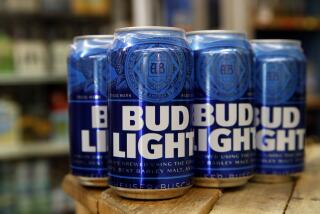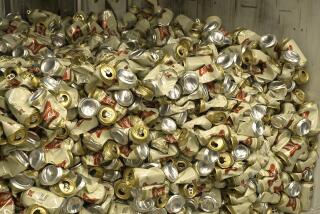Brewer Urged to Alter Name, Ad Campaign : Marketing: Surgeon General Antonia Novello calls G. Heileman Brewing Co.’s plans for a new malt liquor ‘socially irresponsible.’
- Share via
WASHINGTON — Surgeon General Antonia C. Novello on Tuesday called on the marketer of a potent new malt liquor beverage named PowerMaster to change the product’s name and scrap a sales campaign that appears targeted at minority consumers.
PowerMaster is a high-alcohol drink that has drawn criticism from health and minority activists, who charge that its maker plans to promote it to poor blacks and Latinos. The product, made by the G. Heileman Brewing Co. of Wisconsin, contains about a third more alcohol than other malt liquors, including Heileman’s best-selling Colt 45 brand.
Novello called Heileman’s marketing plans for PowerMaster “socially irresponsible,” adding in an interview: “It’s true this is a legal product, but the problem is that they are targeting some populations that are already very prone (to health risks). . . . In a subconscious way, I think they think these people are expendable.”
She cited a 1978 federal health study indicating that black men between ages 25 and 44 are 10 times more likely than the general population to die of cirrhosis of the liver. Malt liquors are particularly popular with blacks, and much of the marketing for these products is directed at them.
Novello has no authority to ban or change a product, but her criticism lends weight to the campaign by a number of groups to pressure Heileman to discontinue it.
PowerMaster is expected to be in stores within a few weeks. Its billboard ads feature a black model and the slogan “Bold, Not Harsh.” The slogan and the use of the word “power” in the product’s name have prompted criticism that Heileman is subtly promoting PowerMaster’s alcoholic kick. Citing such concerns, the Bureau of Alcohol, Tobacco and Firearms last week asked Heileman to eliminate the word “power” from the product’s name.
Novello, one of the nation’s top health officials, said consumers might not be initially aware that drinking one bottle of PowerMaster is equivalent to drinking two or three beers. As a result, she advocated changing federal rules to require beer and malt liquor makers to disclose the alcohol content of their products on labels.
Current rules, in place since the end of Prohibition in 1935, forbid such disclosure on the theory that brewers would use it to entice more consumption. Novello said she will meet with officials of several regulatory agencies next week to discuss changing the rules.
PowerMaster contains 5.9% alcohol by weight, compared to 4.5% for Colt 45, Schlitz Malt Liquor and other popular brands, although some have as much as 10.9% alcohol. Regular beer has less than 4% alcohol.
A spokeswoman for Heileman said the company had no comment about PowerMaster.
But James Sanders, president of the Beer Institute, the industry’s Washington-based trade group, said, “The strange inference drawn from these charges is that this product is somehow being marketed unfairly. That’s not true. Everyone sells his product to the people who prefer them. . . . People can make up their own minds about what product they prefer.” Sanders called the campaign against PowerMaster “patronizing” to black and Latino consumers.
The PowerMaster promotion is the latest in a series of tobacco and alcohol marketing campaigns that have drawn fire from federal health officials. In January, Novello objected to the promotion of Cisco, a high-potency wine that was packaged to look like many low-alcohol wine coolers (Cisco’s packaging has since been changed). In April, Secretary of Health and Human Services Louis W. Sullivan called on tobacco companies to end their sponsorship of sports events.
And last year, Sullivan successfully pressured R. J. Reynolds Tobacco Co. to drop two new cigarettes it had planned to market--Uptown, which was aimed at young inner-city blacks, and Dakota, which Reynolds had discussed selling to poorly educated young women.
On Tuesday, a coalition of 21 organizations--ranging from the National Council on Alcoholism and Drug Dependence to the National Alliance of Black School Educators--asked the government to adopt new rules restricting the alcohol content of malt liquors to 5% and to disallow names connoting alcoholic strength, such as Colt 45 and Magnum.
More to Read
Sign up for Essential California
The most important California stories and recommendations in your inbox every morning.
You may occasionally receive promotional content from the Los Angeles Times.













